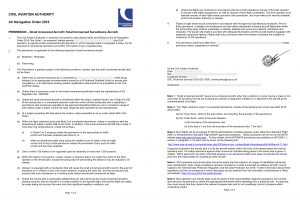
There’s no doubt that drones are amazing tools that can provide benefits in so many areas of both our business and personal lives. If you’re looking at hiring a drone operator however, there are some facts that you need to know about. What are the legal requirements for them to adhere to in order to work safely and legally in the UK?

We’ll be publishing a series of blog posts on this subject right here on the DSR website over the coming weeks. We will be aiming to demystify some of the laws, the bizarre press accounts of drone behaviour and explain some of the acronyms that you see in a lot of the explanation text to make it all crystal clear.
Understanding these legal requirements can help you to understand why there are sometimes additional considerations and arrangements that a pilot may have to make when providing you with a quotation for the work you would like carried out.
Legal Requirement 1: CAA Permission
So this is a non-negotiable condition for drone pilots who are operating commercially:-
No drone operator can fly without permission from the Civil Aviation Authority (CAA).
You’ll sometimes see the CAA permission referred to as “PfCO” (Permissions for Commercial Operation) and it’s an actual piece of paper issued by the CAA to grant the pilot the right to fly.
This isn’t a case of a pilot simply filling in a form and sending a cheque. It’s a rigorous process involving theoretical exams and practical flight assessments by one of a set of specially accredited providers (NQE – National Qualified Entity) and creation of a detailed manual of operations. Then this permission must be reapplied for every year to ensure that safe and legal practices are still being followed, and changes in the law are accommodated.
You absolutely MUST ask your pilot to show their PfCO to you and you should then check that it is current on the CAA website. All DSR pilots have one of these certifications (DSR only offer legally qualified pilots) and they will never mind showing it to you – in fact, they will probably offer it to you and insist you take a look. They are all slightly different in the wording but here’s an idea of what it will look like.
You can also check it against the CAA register of Pilots with permission here (this list is updated monthly). The permission might be in the name of a company or, in the case of a sole trader, in their individual name but this is a great way to check that their permissions are current and legitimate if you have any doubts. If a pilot say they don’t have one or refuse to show you, then do not hire them!
Condition 2: Commercial Insurance
Every commercial drone pilot, in addition to holding CAA Permission, must also hold valid commercial insurance that is compliant with the CAA requirements.
There are a number of drone specific insurers out there so there will be a slight difference in the appearance of the certificate but you should also ask to see it and check that it is in date and covers the appropriate public liability for the job/project in mind. Cover should start at a minimum of £1m.
Hiring a Drone Safe Register Pilot
Without both of these two documents being present and current, it’s illegal for a drone pilot to fly commercially. The question that you then have to ask yourself is that, if someone is prepared to ignore these two basic requirements, how much will they really care about the preparation and practices for safe drone flight?
Hiring your drone pilot through Drone Safe Register ensures that these two requirements are met as we only allow legal, qualified members who we verify for you. They will be able to show you all of the relevant paperwork and you can rest assured that you are working with safe and legal drone professionals.


